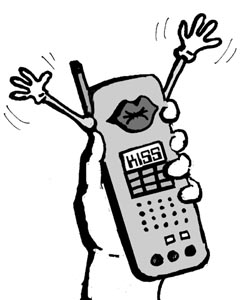![[Metroactive Features]](/features/gifs/feat468.gif)
[ Features Index | San Jose | Metroactive Central | Archives ]
 Celluphony What is the point when you have a life? By Annalee Newitz TWO OF MY FRIENDS, who shall remain nameless, spent a recent Sunday getting really, really drunk. At some point during their journey into intoxication, they decided I needed to join them at some crappy Haight bar where they were cruising a couple of girls from Chicago. They decided to call my cell phone and request my presence. But I was at industrial film archivist Rick Prelinger's screening, watching a once-ubiquitous, now extremely rare piece of World War II anti-Japanese propaganda called My Japan. A white actor in Asianface described in mesmerizing, creepy detail how the Japanese "laugh at your bombs," and I mused about historical ephemera: one generation's "educational film" is another generation's outrageous example of racism. Meanwhile, my increasingly drunken friends were trying to reach me from the small Nokia whose lonely vibrations reached nothing but my coat pocket, stashed in the hallway. By the time Rick had run the last reel, I had three very long voicemails. "You've failed as a cell phone owner," one said. "We're supposed to be able to reach you anywhere with this thing, and you're just not there. The words that come to mind are 'What the hell?' I mean, where ARE you?" Another message, time-stamped an hour later, was just a bunch of pseudo-sexual screams and random chords from this busted-up guitar my pals had found on the street. The tone of these messages was qualitatively different from what you'd expect on an answering machine. Their increasingly more crazed urgency was not caused by my absence--something an answering machine usually means on a weekend night--but by the fact that I was supposed to be present with the phone at all times, connected to it, answering every alcohol-induced request or work-related emergency. Half the people I know (including those cell phone-abusing drunkards), don't have cell phones because they're afraid of this very thing happening to them. People will be able to reach them 24 hours a day, no matter where they are, and hassle them: Go get a beer with me; Come into the office and fix the crashed Microsoft NT servers; Your mother has a cold; The cat got out; Can you pick up a carton of half-and-half at the market on your way home? Who wants to deal with that shit? Nobody. And yet most of the large events I've attended over the last year have involved a high volume of cellular phonage. When I talked to my pal Karen about meeting at the Dyke March, she said, "Call my cell phone when you get there, I'll call Joyce, and we'll triangulate." A party we'd attended at City Hall some months ago was similarly finessed. Whenever we lost each other among the droves of dot-commers eating raw oysters, we just called. "Hey," I yelled to Karen over the bad connection, "I'm in the West Wing! Where are you?" Someone I was dating described it as "romantic" when he called my cell at a pay phone across the street from a bar where we were meeting. I walked outside, still on my cell phone, and talked as I walked towards him--we were just close enough to be visible to each other, but far enough apart that we were not within earshot. There's that intimate, walkie-talkie feel to cell phones--they extend and broaden our conversations in ways that seem the opposite of invasive. Sure, people talking to each other on cells from across the street look idiotic, but there is always the romantic underbelly to consider: they've found each other at last, guided only by voice. (OK, no jokes about people running in slomo through a field of flowers towards each other, their Nokias nestled next to their ears.) The more random our movements become, the more fragmented our lives, the better it is to be able to "triangulate" with a cell phone. In a way, cell phones are like that creepy chunk of propaganda I watched when I could have been drinking--historical ephemera, signs of a time when people are so often away from home that it makes no sense to try to reach them there. When we look back at the early 21st century, it will clearly be a time of celluphony, when those who can afford it are always in touch technologically, tracking each other, blurring the line between private time and public time. Are you under surveillance or in communication?
Annalee Newitz is a surly media nerd who will admits that Charles is right and sometimes her columns just trail off kind of weirdly. [ San Jose | Metroactive Central | Archives ]
|
From the July 13-19, 2000 issue of Metro, Silicon Valley's Weekly Newspaper.
Copyright © 2000 Metro Publishing Inc. Metroactive is affiliated with the Boulevards Network.
For more information about the San Jose/Silicon Valley area, visit sanjose.com.